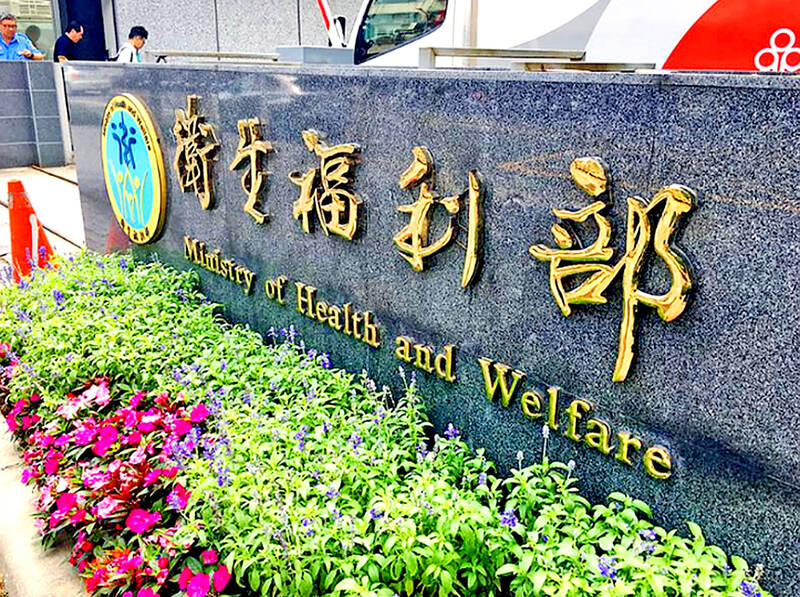The Ministry of Health and Welfare on Friday officially renamed mpox in Mandarin to avoid stigma associated with its previous name in accordance with a WHO decision to phase out the term “monkeypox.”
From Feb. 1, the Mandarin name for the disease is to be mpox (M痘), the ministry said.
In early May 2022, mpox cases in countries where the disease is not endemic began to increase, and on Nov. 28 that year, the WHO announced that it would use the term mpox to avoid “racist and stigmatizing language” associated with monkeypox.

Photo: Lin Hui-chin, Taipei Times
The global health body said it would use mpox as a synonym for monkeypox immediately, while both terms would be used simultaneously for a year until monkeypox is phased out.
Although the Centers for Disease Control (CDC) adopted the new English name mpox when referring to the disease, the Mandarin name monkeypox (猴痘) remained.
CDC Deputy Director-General Philip Lo (羅一鈞) yesterday said the centers passed a resolution to rename the disease at an mpox prevention and response meeting on Sept. 22 last year.
The resolution was published with a comment period from Nov. 3 last year to Jan. 2, Lo said.
As the ministry received no public comments opposing the proposal, it officially adopted the change on Friday, he said.
The change would not affect reporting rules or time limits for reporting the category 2 notifiable communicable disease, as the name in guidelines is being modified, he added.
Since mpox was classified as a category 2 notifiable communicable disease on June 23, 2022, 359 cases — 340 local and 19 imported cases — have been reported.
No mpox cases have been reported in Taiwan for nine weeks, since Nov. 13 last year, Lo said.
As WHO guidelines state that the disease can only be considered eliminated after three months of no new local cases under adequate surveillance, the CDC would need to monitor the disease until the middle of next month to confirm its elimination, he said.
As of Monday, 73,275 people had been vaccinated against mpox, including 45,606 people who are fully vaccinated with two doses, he said, adding that the CDC has about 25,000 doses in reserve, and those who only received one dose are encouraged to get the second dose for better protection.

MAKING WAVES: China’s maritime militia could become a nontraditional threat in war, clogging up shipping lanes to prevent US or Japanese intervention, a report said About 1,900 Chinese ships flying flags of convenience and fishing vessels that participated in China’s military exercises around Taiwan last month and in January last year have been listed for monitoring, Coast Guard Administration (CGA) Deputy Director-General Hsieh Ching-chin (謝慶欽) said yesterday. Following amendments to the Commercial Port Act (商港法) and the Law of Ships (船舶法) last month, the CGA can designate possible berthing areas or deny ports of call for vessels suspected of loitering around areas where undersea cables can be accessed, Oceans Affairs Council Minister Kuan Bi-ling (管碧玲) said. The list of suspected ships, originally 300, had risen to about

DAREDEVIL: Honnold said it had always been a dream of his to climb Taipei 101, while a Netflix producer said the skyscraper was ‘a real icon of this country’ US climber Alex Honnold yesterday took on Taiwan’s tallest building, becoming the first person to scale Taipei 101 without a rope, harness or safety net. Hundreds of spectators gathered at the base of the 101-story skyscraper to watch Honnold, 40, embark on his daredevil feat, which was also broadcast live on Netflix. Dressed in a red T-shirt and yellow custom-made climbing shoes, Honnold swiftly moved up the southeast face of the glass and steel building. At one point, he stepped onto a platform midway up to wave down at fans and onlookers who were taking photos. People watching from inside

Japan’s strategic alliance with the US would collapse if Tokyo were to turn away from a conflict in Taiwan, Japanese Prime Minister Sanae Takaichi said yesterday, but distanced herself from previous comments that suggested a possible military response in such an event. Takaichi expressed her latest views on a nationally broadcast TV program late on Monday, where an opposition party leader criticized her for igniting tensions with China with the earlier remarks. Ties between Japan and China have sunk to the worst level in years after Takaichi said in November that a hypothetical Chinese attack on Taiwan could bring about a Japanese

STREAMLINED: The dedicated funding would allow the US to transfer equipment to Taiwan when needed and order upgraded replacements for stockpiles, a source said The US House of Representatives on Thursday passed a defense appropriations bill totaling US$838.7 billion, of which US$1 billion is to be allocated to reinforcing security cooperation with Taiwan and US$150 million to replace defense articles provided to the nation. These are part of the Consolidated Appropriation Act, which the US House yesterday passed with 341 votes in favor and 88 against. The act must be passed by the US Senate before Friday next week to avoid another government shutdown. The US House Committee on Appropriations on Monday unveiled the act, saying that it allocates US$1 billion for the Taiwan Security Cooperation Initiative